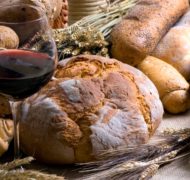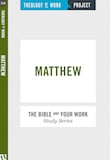The Last Supper (Matthew 26:17-30)
Bible Commentary / Produced by TOW Project
The plot to kill Jesus moves forward as Judas (one of the Twelve) goes to the religious leaders with an offer to turn him over to the temple soldiers. With events moving quickly toward crucifixion, Jesus shares a final meal with his disciples. In that meal, Jesus chooses the manufactured items of bread and wine to represent himself and his coming sacrifice. Holding up a loaf of bread, he says, “This is my body” (Matt. 26:26); then holding up the skin of wine, he says, “This is my blood” (Matt. 26:28). The Son of God is the product of no one’s work, not even the Father’s. In the words of the Nicene Creed, he is “begotten, not made.” But he chooses common, tangible things like bread and wine, made by people to illustrate his sacrifice. As Alan Richardson puts it:
Without the toil and skill of the farmer, without the labour of the bakers, the transport workers, the banks and offices, the shops and distributors—without, in fact, the toil of mines and shipyards and steel-works and so on—this loaf would not have been here to lay upon the altar this morning. In truth, the whole world of human work is involved in the manufacture of the bread and wine which we offer.... Here is the strange unbreakable link that exists between the bread that is won in the sweat of man’s face and the bread of life that is bought without money or without price.[1]
The entire community participates.
We cannot pretend to know why Jesus chose tangible products of human labor to represent himself rather than natural articles or abstract ideas or images of his own design. But the fact is that he did dignify these products of work as the representation of his own infinite dignity. When we remember that in his resurrection he also bears a physical body (Matt. 28:9, 13), there can be no room to imagine the kingdom of God as a spiritual realm divorced from the physical reality of God’s creation. After creating us (Genesis 2:7; John 1), he chose articles of our handiwork to represent himself. This is a grace almost beyond comprehension.








